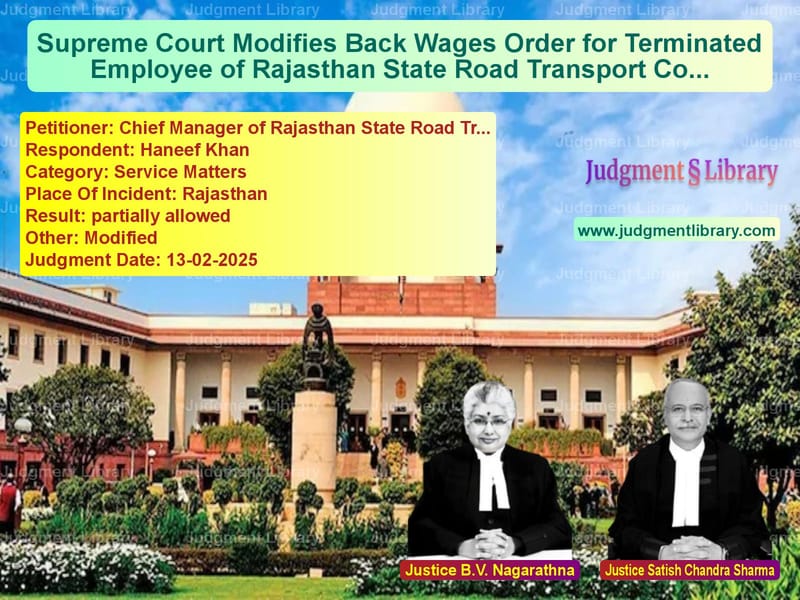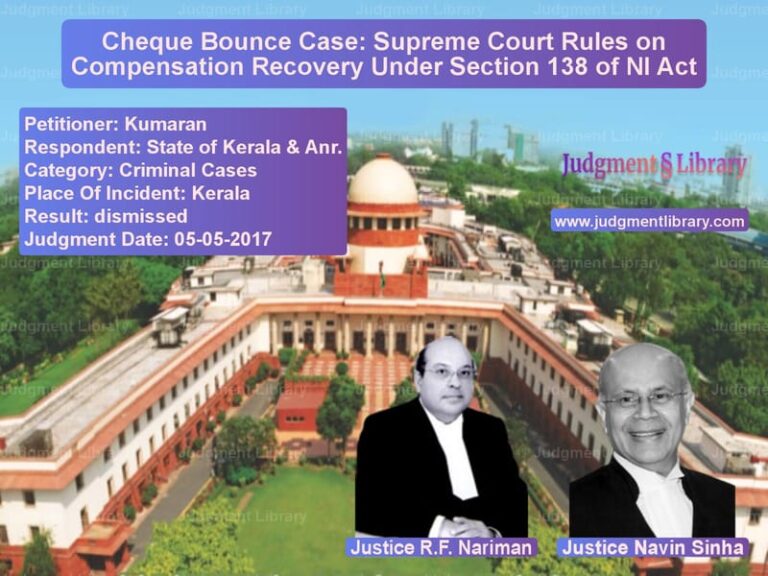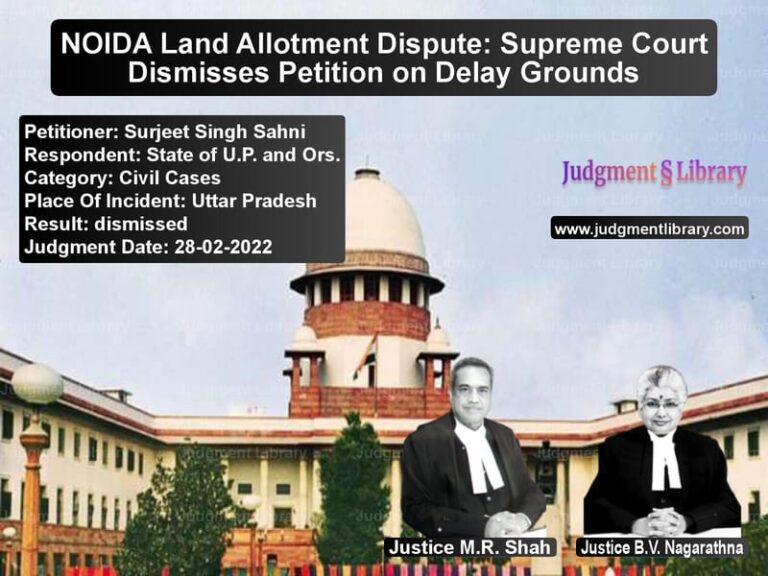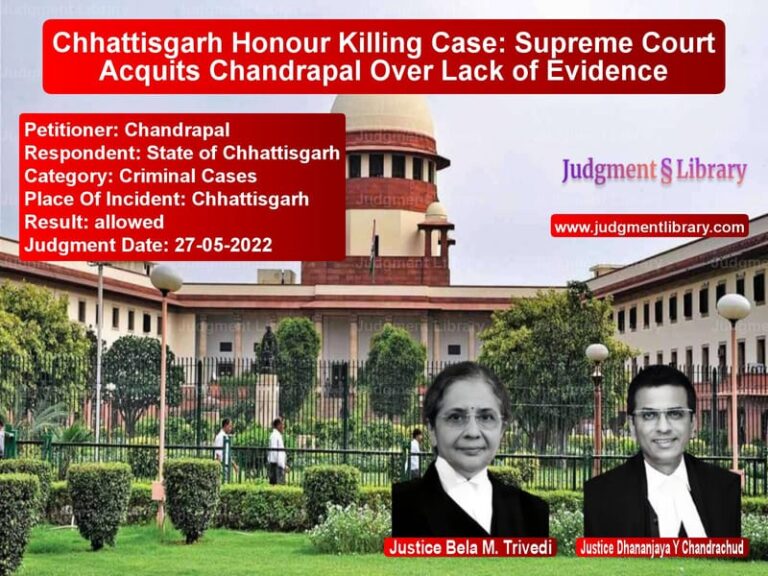Supreme Court Modifies Back Wages Order for Terminated Employee of Rajasthan State Road Transport Corporation
The Supreme Court of India has modified the order granting full back wages to a terminated employee of the Rajasthan State Road Transport Corporation (RSRTC), reinstating an earlier High Court order that had limited back wages to 50%. The ruling was delivered in the case of Chief Manager of Rajasthan State Road Transport Corporation v. Haneef Khan. The Court held that granting full back wages for a ten-year period without work being performed was unjustified and restored the previous direction for 50% back wages.
Background of the Case
The case arose from the termination of Haneef Khan, an employee of RSRTC, on October 4, 2001. The Labour Court ruled in his favor, rejecting RSRTC’s plea under Section 33(2)(b) of the Industrial Disputes Act, 1947. Consequently, Khan was deemed to have continuity of service. The High Court of Rajasthan, in its order dated February 12, 2019, directed RSRTC to pay Khan 50% of back wages for the period from October 4, 2001, to November 30, 2010, along with continuity of service.
However, Khan filed a review petition seeking full back wages, which the High Court allowed on July 11, 2022. This prompted RSRTC to approach the Supreme Court.
Key Legal Issues
- Whether the High Court was justified in modifying its original order to grant full back wages.
- Whether an employee who did not perform duties for nearly ten years is entitled to full back wages.
- The appropriate balance between employee rights and employer liabilities in reinstatement cases.
Arguments by the Appellant (RSRTC)
The appellant, RSRTC, argued:
- The High Court erred in modifying its original judgment to grant full back wages.
- The employee had not worked for nearly a decade, and granting full wages for that period was inequitable.
- The Labour Court’s ruling only implied reinstatement and continuity of service, not automatic entitlement to full wages.
- The initial order of granting 50% back wages was fair and reasonable.
“The modification allowing full back wages is excessive and places an undue financial burden on the employer.”
Arguments by the Respondent (Haneef Khan)
The respondent, Haneef Khan, countered:
- Since his termination was illegal, he was entitled to full back wages as a matter of right.
- The High Court correctly acknowledged his right to full wages by modifying its earlier order.
- As he was wrongfully deprived of his livelihood, any deduction from back wages would be unjust.
“The continuity of service granted by the Labour Court naturally extends to full back wages as compensation for the illegal termination.”
Supreme Court’s Observations
The Supreme Court analyzed the case and made the following key observations:
- The principle of awarding back wages depends on various factors, including whether the employee had worked elsewhere during the intervening period.
- The modification by the High Court in 2022 was unwarranted since the original judgment in 2019 had already balanced the equities by awarding 50% back wages.
- The employee’s non-performance of duties for a decade justified a reduction in back wages.
- The Labour Court ruling on continuity of service did not automatically entitle the respondent to full back wages.
“While the respondent is entitled to reinstatement and certain monetary benefits, full back wages without service rendered would be an unjustified financial burden on the employer.”
Final Judgment
The Supreme Court ruled:
“The order dated July 11, 2022, modifying the High Court’s earlier order to grant full back wages is set aside. The original judgment dated February 12, 2019, granting 50% back wages, is reinstated. The appellant-corporation shall comply with the said order within one month.”
The Court also directed that all retirement benefits be provided to the respondent, as he had since reached superannuation.
Impact of the Judgment
This ruling reinforces key legal principles:
- Confirms that back wages must be proportionate and balanced against actual work performed.
- Prevents excessive financial burdens on employers in reinstatement cases.
- Establishes that High Courts should exercise caution when modifying previous judgments.
- Ensures that employees receive fair compensation while recognizing practical limitations.
By reinstating the 50% back wages order, the Supreme Court has provided a balanced resolution that protects both employer and employee interests.
Petitioner Name: Chief Manager of Rajasthan State Road Transport Corporation.Respondent Name: Haneef Khan.Judgment By: Justice B.V. Nagarathna, Justice Satish Chandra Sharma.Place Of Incident: Rajasthan.Judgment Date: 13-02-2025.
Don’t miss out on the full details! Download the complete judgment in PDF format below and gain valuable insights instantly!
Download Judgment: chief-manager-of-raj-vs-haneef-khan-supreme-court-of-india-judgment-dated-13-02-2025.pdf
Directly Download Judgment: Directly download this Judgment
See all petitions in Employment Disputes
See all petitions in Pension and Gratuity
See all petitions in Judgment by B.V. Nagarathna
See all petitions in Judgment by Satish Chandra Sharma
See all petitions in partially allowed
See all petitions in Modified
See all petitions in supreme court of India judgments February 2025
See all petitions in 2025 judgments
See all posts in Service Matters Category
See all allowed petitions in Service Matters Category
See all Dismissed petitions in Service Matters Category
See all partially allowed petitions in Service Matters Category







